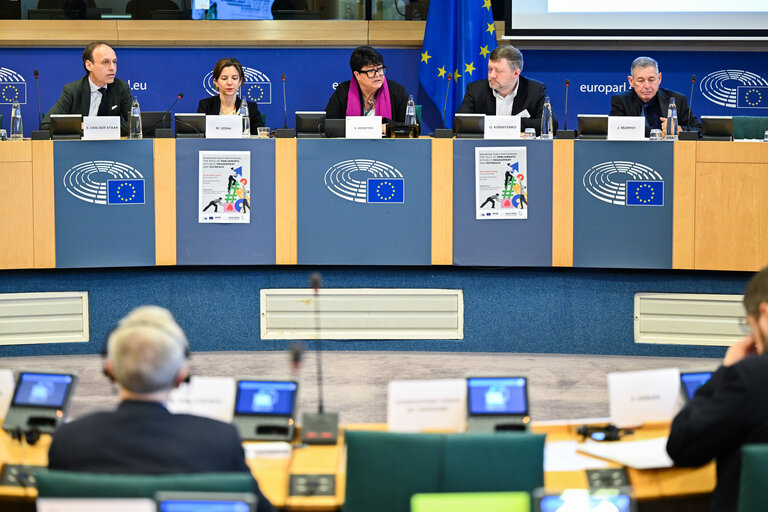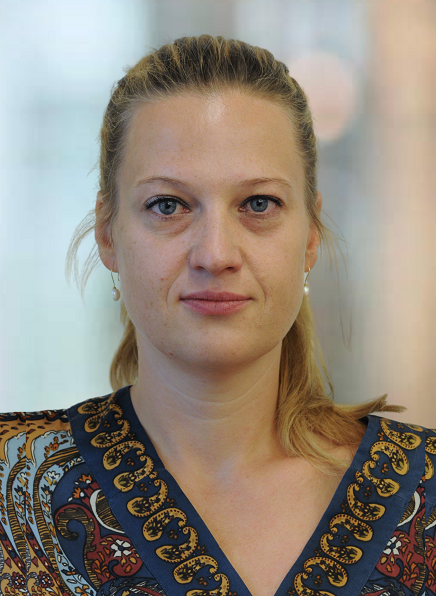
This was one of the objectives of the conference Enhancing Public Participation: The Role of Parliaments in Public Engagement and Outreach, which brought together participants from the European Union, Ukraine, the Republic of Moldova and Montenegro.
The conference was organized by the European Parliament under the auspices of its Democracy Support and Election Coordination Group on 18-19 March 2025. International IDEA's Europe Office and the Inter Pares Programme, funded by the EU and implemented by International IDEA, supported and co-organized the event. Members of Parliament from Ukraine, Moldova, and Montenegro exchanged with members of parliament, staff, and experts of the European Parliament, its political groups, and EU national parliaments on best practices for parliamentary communications and citizen engagement. Experience and lessons learned in engaging through social media, traditional media, as well as via personal outreach and activities that facilitate direct communication with constituencies and individual citizens were discussed. Participants agreed that engaging with citizens beyond elections is crucial for building trust, and outreach efforts must be authentic and inclusive, focusing on effectively engaging marginalised groups.
The participants also discussed how to engage various audiences, including young people, with practical examples from Austria and other EU member states. “Engaging young people to stay in Ukraine and work on our democracy is one of our key priorities. The Ukrainian parliament’s outreach through social media increased ten times since the beginning of the Russian aggression and we also intensified our outreach through online and physical meetings with this target audience, including visiting schools and discussing the role and functions of the Verkhovna Rada,” said Oleksandr Korniyenko, First Deputy Chairperson of the Verkhovna Rada of Ukraine. Youth are vital for the long-term survival of democracy. Engaging with schools and universities, boosting civic education, and democratic and media literacy were some of the key recommendations voiced by the conference participants.
The thematic focus of the conference was on communicating EU enlargement. Key takeaways underscored that communicating EU integration requires extensive public engagement and transparency. From Ukraine's efforts to counter Russian disinformation and reintegrate affected individuals, to Moldova's challenge of communicating to secessionist regions and Montenegro's emphasis on showing the tangible benefits of EU accession, each country needs to tailor their approach to reflect its unique challenges. Messages, including on enlargement, need to be crafted in ways that are easily understood by citizens and respond to their concerns. Identifying key opinion leaders helps amplify messages on EU policies, ensuring that communication resonates with diverse audiences.
Being on the ground, being part of conversations that matter to people, and making use of parliamentary support structures to engage with local communities and increase transparency in lawmaking were some of the key recommendations for impactful parliamentary communication and outreach to citizens.
Key Conference Takeaways
Engaging citizens beyond elections is crucial for trust in democratic institutions.
Actions:
- Implement programmes like the European Parliament’s “Back to School” initiative. It allows for a continuous dialogue between politicians and voters while learning about the functioning of democratic institutions.
- Be authentic. Activate audiences by expanding the scope of conversation to topics that matter to people and inspire voters to engage.
- Go to constituencies, be present at a local level between elections and speak people’s language when explaining political decisions and their implications.
- Use social media, but do not overuse them. Authenticity, humor, and storytelling resonate with audiences more than formal statements and enable politicians to connect directly with various audiences. However, social media engagement needs to be balanced with personal interaction with voters.
- Combat misinformation through a proactive, multi-platform strategy. Put in place robust legislative and regulatory frameworks, dedicate parliamentary resources to support efforts to counter fake news and trolling, work with law enforcement and tech companies.
Engaging inclusively ensures that political processes represent all citizens.
Actions:
- Reach and listen to the underrepresented voices of citizens and civil society through special outreach efforts.
- Be inclusive in all activities at national, regional and local levels.
- Show that public engagement can directly influence legislation. Take on board input and feedback on legislative proposals from citizen initiatives, petitions, youth caucuses or youth parliaments. Communicate about results to generate grassroots support.
- Involve parliamentary administrations in enhancing outreach. Institutional support structures can help with engaging local communities.
- Institutionalized participation can be an effective way to engage with civil society. Embed civil society and experts in legislative discussions through structured engagement and consultation mechanisms.
Communicating EU integration requires extensive public engagement, transparency and strategic messaging.
Actions:
- Explain that EU accession is a long and complex process. Benefits and trade-offs have to be openly discussed. Avoid EU jargon.
- Manage expectations and avoid empty promises that result in a lack of trust. Dispel any myths related to EU accession early on.
- Identify audiences that are reticent or skeptical. Target their concerns with specific messages.
- Identify key opinion leaders. Religious figures, media influencers, civil society and political groupings outside of parliament can help amplify messages on EU policies, ensuring that communication resonates with diverse audiences.
The conference can be viewed through this link.
For further information about the conference and bilateral meetings of the Verkhovna Rada of Ukraine representatives on the side of the conference, please see this article: Top news - Support for Ukraine and the path towards EU accession: results of the Ukrainian delegation's visit to Brussels - Verkhovna Rada of Ukraine





